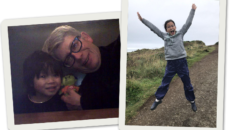I was oddly happy when I got the news, a few weeks before his birth, that the baby was a boy. Raising a boy, I thought, would allow for less duplication. If I didn’t see myself in him, I had a better chance to see him for himself. Whatever the gender, an adopted child would never have to deal with my genetic baggage—for instance, the mortifying trial of being taller than everyone all through primary school.
I had already accumulated anxieties when I thought the baby would be a girl. I’d figured out what to do to strengthen her ankles if she had loose joints: the ballet lessons my parents had refused. She could wear her hair however she wanted, that was for sure. Unlike me. That’s how it went, in classic mother-daughter fashion: she-me, she-me, she-me. With a boy, there would no problematic blurring of boundaries. He would come into my life with his own full-fledged boy’s needs, strengths, and sorrows.
Indeed, Luc was born a boy. I was at the birth, waiting to hold him. I don’t know how long our separateness lasted. Probably a full three or four seconds. He was in my arms when he opened his eyes for the first time. I knew he couldn’t focus yet, but he gazed toward me so that, as we began our life together, I was looking at him looking. I thought afterward that there was something so right about our beginning. After all, as a writer, I place special value on observation. Throughout his infancy, I’d often lift him up to get the best view. At home in our fourteenth-floor apartment, his high chair was near a picture window, and I remember applauding when he first spotted helicopters and airplanes so far away they seemed like mosquitoes and flies. He was a very alert baby, and I found myself weirdly proud of that.
“He loves to look,” I’d explain. “I just hope he won’t decide to be a journalist.” It was a joke, I thought. The he-me, he-me thing didn’t occur to me. I realized my error, nearly three years later, when I heard myself scolded for tardiness, for the first time in several decades.
How Luc Learned to Be Late
“Miss Clements?” intoned the director of Luc’s daycare center. “Would you make every effort to have Luc here by 9:30?”
Too many ancient traumas were bobbing to the surface for my mind to function well at this point—also, it was very early in the morning. So I can’t recall the many reasons I offered for our recent spate of late arrivals.
“It isn’t frivolous,” I finally heard myself explaining.
“I didn’t say it was,” the director replied, “I just asked if you could have him here on time.”
Safely back home, I brooded over the incident. Flashbacks to the constant problem of tardiness during my early school years made it almost impossible to think straight. But I had to admit to myself I had done it.
Every morning, I had piled on both the impediments to departure and the franticness. Some of my old tricks had come in handy: To save a little time dressing him, I sent Luc to bed wearing pajama bottoms but his school clothes on top. Come morning, as if to counter the five minutes gained, I let him dally at breakfast an extra ten. And then there was the lost shoelace, the cat escaping into the hall, the elevator that just never came. In brief, we were late almost every morning. I was well on my way to giving Luc a complete education in how to be late for school, feel awful about being late, and have absolutely no clue what to do about it.
You’re thinking that if we got up half an hour earlier we’d have no problem? But Luc has a hard time waking up in the morning (as I do), since he goes to sleep too late at night (as I do), because he is rather on the nocturnal side—as, by strange coincidence, am I.
What We Pass on Without Knowing
As I realized the morning of the scolding, Luc and I had grown together, and not always in his best interest. Sure, some of the attitudes we have in common seem harmless enough. I suppose it’s from me that he got the habit of bringing his hand to his forehead and calling out, “Oh, no!” every time the phone rings. Not much of a problem there. But it gets a little stranger: I can’t tell you how often I’ve been told my son looks French. It’s true I speak French to him, so I sometimes postulate that saying certain syllables has formed his mouth a certain way. In fact, many adoptive parents I know say they are told their children look like them. Is it only in the eye of the well-meaning observer, or is the child’s likeness that uncannily accurate? There is no doubt that we, too, pick up a great many attitudes from our kids. You can’t watch all those episodes of Sesame Street and come out of it the same woman. You just can’t.
On the most apparent level, the phenomenon is not only harmless but funny. “My mother is of the I’m-cold-so-please-put-on-a-sweater variety,” someone told me. But there are some serious types of unconscious instruction. We all know some parents who have assigned a deficiency of their own to their child: the father who is “helping” his son to be more athletic, for instance, or the reverse, insisting the boy is much, much too smart to care about sports.
It used to be thought natural to confuse oneself with one’s child, as if the confusion was a tool of the Darwinian process, ensuring the parent would care for the child as if for himself. Indeed, we feel our children continue us in the world. We are all obsessed with what we should teach our children, but there is another preoccupation, seldom acknowledged, which is the tremendous fear we have regarding what we pass on to them without knowing.
Luc and I are now on a new morning schedule. That is, we are on a new nighttime schedule that will enable us to get on a new morning schedule. Or so I hope. So far this week, he hasn’t once gone to sleep at the appointed time. This occurred to me last night as we sat down to dinner at nine p.m. How does it get to be nine so quickly every night? Perhaps it’s partly because every day, when I pick him up from day care, Luc pleads to go to the espresso place around the corner. Not the more comfortable pizza place, mind you; it has to be the espresso place. I have a cappuccino, he has a hot chocolate. Soon, he spills it on the table, but his poise makes me wonder: Is there such a thing as a dormant caf-society gene?
He must somehow get it from me. But how? The mysterious power of the bond between a parent and a child asserts itself even more dramatically, in some ways, when there is no genetic link. How do our moods instruct our children? And what biochemical discourses are ongoing? Our pheromones, our smells, whether our pupils are dilated, all the minutiae of our bodies teach our children, at least by example.
Where I End and He Begins
No wonder we’re surprised—often pleasantly so—when our child somehow reminds us where we end and he begins. Then we can hear him making his music, in the same key as ours some of the time, but singing his very own melody.
“Maman!” Luc said to me the other day. (Lately, he’s been speaking partly French, partly English.)
“Oui?” I said.
“You are my best friend?” he asked.
Where had he gotten that? It isn’t a phrase he heard from me. “He’s not even three!” I thought. And already he’s coming home with endearments heard elsewhere, born of other relationships, other sources.
It’s not one generation alone that leaves a legacy whose origins we cannot trace. What is more clearly transmitted, though, is the profound knowledge of our children’s vulnerability and our mysteriously rich sense about how to protect them. And if this leads to the occasional feeling of merging, perhaps that’s all for the best. It may be just another way that love somehow makes us feel both very separate and very close at the same time. I remember when Luc was a little baby, I used to hold him up in front of the mirror and point to him and then to me in the mirror, to him again, to me again. “Here’s you,” I’d say, pointing to him, and then I’d point to myself. “Here is me.” You, me, you, me, you-me. Sometimes, in the mirror, he would look back gravely. Sometimes, he smiled. I smiled. He smiled.



